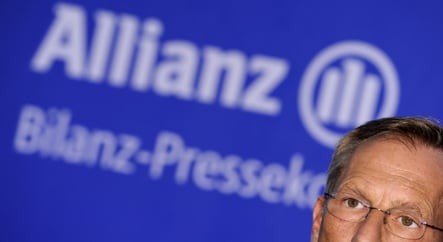Allianz said its net loss amounted to €2.44 billion ($3.1 billion), while analysts polled by Dow Jones Newswires had pencilled in a more modest drop of €1.86 billion.
In 2007, Allianz had made a net profit of €7.97 billion. The insurance group booked a charge of €6.4 billion in connection with the sale of Dresdner to the second biggest German bank, Commerzbank. That sale was completed on January 12 2009, “more than half a year earlier than originally intended,” the insurer noted in a statement.
Allianz shares leapt by 9.36 percent to €53.75 in early trading on the Frankfurt stock exchange, while the DAX index of leading shares was 1.48 percent higher overall. On the operating level, Allianz made a profit of €7.43 billion, but that was 25 percent below the year earlier figure, and slightly lower than an analyst forecast of €7.50 billion.
The management board would propose a dividend of €3.50 per share for 2008, the statement said, down from €5.50 in 2007.
“Our result of €7.4 billion deserves recognition considering the challenging environment,” it quoted Allianz chairman Michael Diekmann as saying.
Combined revenues last year fell by 5.3 percent to €92.5 billion, the statement said, while net income from continued business, excluding Dresdner, dropped to €4.0 billion from 7.3 billion in 2007.
“The difficult conditions in the capital markets will continue throughout 2009. We are in the midst of the toughest economic downturn for decades,” Diekmann said. “Reliable profit forecasts for 2009 are not possible in this environment.”
In the final quarter of 2008, a period marked by volatile financial markets following the bankruptcy of US investment bank Lehman Brothers, Allianz showed a net loss of €3.11 billion, compared with a profit of€ 665 million in the same period a year earlier.
In Allianz’s core activity of property and casualty insurance, the group reported a slight increase in premium income to €43.2 billion, along with an operating profit of €5.6 billion, which represented a decline of around 10 percent from 2007.
Getting rid of Dresdner was a top priority for Allianz last year. The insurance group ended up selling its loss-making bank for a total of €5.124 billion, well below the original price tag of €9.792 billion.



 Please whitelist us to continue reading.
Please whitelist us to continue reading.